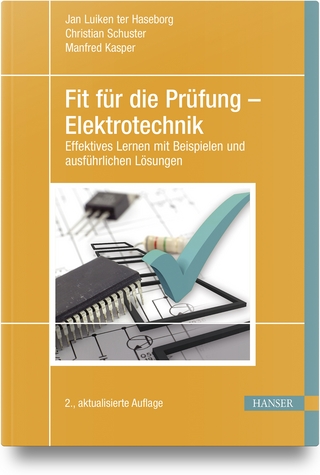
Electric Power
CRC Press (Verlag)
978-1-032-33888-0 (ISBN)
Reducing power outage time to each customer is essential to the overall distribution reliability. This book provides the fundamentals of emergency operation using a graph-theoretic approach and exploration of the subsystem(s) that address the operational aspects of electrical fault occurrence to determine possible feeder reconfiguration. The localization of a faulted segment within a feeder involves remote-controlled normally open (NO) and normally closed (NC) switches through supervisory control and data acquisition (SCADA) between radially energized, interconnected feeders. Topics cover: (1) Data extraction from geographic information systems (GIS), (2) Graph modeling of distribution feeders, (3) Programming for backward/forward sweeping unbalanced power flow, (4) Short circuit analysis and fault localization, (5) Fault isolation, temporary and full service restoration, (6) Outage management and crew coordination, (7) Trouble call tickets and escalation to search for fault, and (8) Emerging subject of distribution management systems (DMS).
FEATURES
•Novel and practical textbook that will help to understand distribution operation in graph theory
•Show how to convert GIS coordinate datasets to graph and how to troubleshoot the geometry errors
•Explain how to troubleshoot power flow divergence due to the bad metering datasets and allocation factor (AF) for each load within primary and secondary networks
•Similar platform as DMS environment, but the graduate students have their hands-on experience to implement the applications in the MATLAB environment
•Detailed modeling in graph theory of distribution feeders and possible reconfiguration to locate power outage
Chee-Wooi Ten is currently an associate professor of electrical and computer Engineering at Michigan Technological University. He received his BSEE and MSEE degrees from Iowa State University, Ames, in 1999 and 2001, respectively, and later received a Ph.D. degree (in 2009) from the University College Dublin (UCD), National University of Ireland. Professor Ten was a power-application engineer working in project development for EMS/DMS with Siemens Energy Management and Information System (SEMIS) in Singapore from 2002 to 2006 when the idea of this book came about, to help software and power-system engineers working in the distribution dispatching center. His primary research interests are modeling for interdependent critical cyberinfrastructures and SCADA automation applications for a power grid. He is a senior member of the IEEE. He is an active reviewer for IEEE PES transactions and has been a member of the IEEE PES Computer and Analytical Method for Cybersecurity Task Force. Dr. Ten is currently serving as an editor for IEEE Transactions on Smart Grid, and for the Elsevier Journal Sustainable Energy, Grids and Networks (SEGAN). Yachen Tang received a Ph.D. degree in electrical and computer engineering at Michigan Technological University in 2018. He earned a BS degree in telecommunication engineering from Jilin University, China, in 2011, and a MS degree in computer engineering from Michigan Technological University, Houghton, in 2014.He is currently with Global Energy Interconnection Research Institute (GEIRI) North America in San Jose. Dr. Tang was previously an intern with Henan Provincial Computer Research Institute for the project entitled "Testing and Processing System for Network Image of Yellow River," from July 2011 to January 2012. He holds a patent on a program for inputting Chinese characters. Since his doctorate program at Michigan Tech, he has been active in reviewing technical articles for the IEEE PES and IET Generation, Transmission & Distribution transactions journals. His research interests include power grid cybersecurity, which spans from modeling of anomalies to interference of inconsistent data related to an electrical distribution system. His research interests also include data mining and analysis, and machine learning. In particular, his contribution to this book involves graph theory establishment on the feeders and possible reconfiguration. That fresh view offers a new perception of topology in data structures where the energization states for each element can be affected during power outages for an inference of the root cause.
Preface. Acknowledgment. Glossary, Acronyms. Part 1 Network Communication Architectures. Interaction Between Entities. Part II Operational Data Modeling and Preparation. Distribution System Topology. Geospatial Data Importation to SCADA System. Available Metering Sources Within Distribution Networks. Part III Computerized Network Applications. Unbalanced Three-Phase Distribution Power Flow. Crew Dispatch Management. Fault Identification Based on Segment Localization. Isolation of Faulted Segment and Service Restoration. Trouble Call Tickets Issued by Customers. Creation of Switching Procedures. Harnessing the Outage Information. Part IV Troubleshooting the Operational Errors. Event Escalation Based on Incomplete Information. Part V Emergin Development. How the New Additions Can Change the Game.
| Erscheinungsdatum | 14.06.2022 |
|---|---|
| Verlagsort | London |
| Sprache | englisch |
| Maße | 156 x 234 mm |
| Gewicht | 394 g |
| Themenwelt | Technik ► Elektrotechnik / Energietechnik |
| Technik ► Nachrichtentechnik | |
| Technik ► Umwelttechnik / Biotechnologie | |
| ISBN-10 | 1-032-33888-1 / 1032338881 |
| ISBN-13 | 978-1-032-33888-0 / 9781032338880 |
| Zustand | Neuware |
| Haben Sie eine Frage zum Produkt? |
aus dem Bereich


